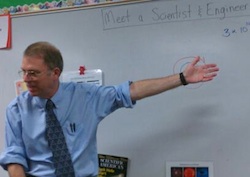
| |
| calendar |
| speakers |
| resources |
| blog |
| contact |
| Art Wallace, M.D. Ph.D. |
Marin Science Seminar Presentations: "Big Data and Medical Innovation” (October 11, 2017 - Previously on February 11, 2015) Dr. Wallace will discuss the use of big data in the scientific development of medical care. He will describe how big data has changed epidemiology, quality improvement, and drug discovery using examples from the U.S. Veteran’s Administration. 2015 flyer here. Dr. Wallace is a Professor of Anesthesiology and Perioperative Care at UCSF Medical Center, and Chief of Anesthesia Service at the San Francisco VA Medical Center. Dr. Wallace holds a B.S. in Engineering from Yale University and received his M.D. and Ph.D. from Johns Hopkins School of Medicine. His Ph.D. is in Biomedical Engineering. Dr. Wallace completed his anesthesiology residency and a fellowship in Cardiac Anesthesiology at UCSF. Previous talks at MSS: "Invention in Medicine: How Medical Devices get Invented and Go to Market” (October 26, 2016) Download the flyer here. Dr. Wallace started out in experimental surgery and radiology studying imaging of the heart using CT scanners. He has worked on a number of devices that originally were built for experimental studies that evolved into clinically useful devices including a cardiac output monitor, the off pump CABG, off pump aneurysm surgery, electronic sedation, and a selective coronary vasodialtor. Dr. Wallace will explain his experiences with the inventive process using examples from both device design and drug development. There will be a brief discussion of the importance of intellectual property, patents, venture capital, FDA approval, and business development in completing the invention process. There will be a demonstration of his recent developmental project on a non-contact, remote patient monitor designed to prevent cardiac arrests. "Making Medicine Safer with Drugs, Devices, Software & More” (October 23, 2013) Download the flyer here. Medical care over the last 150 years has dramatically improved through a combination of research, education, invention, and development. Dr Wallace will discuss the development of drugs, devices, and software that have made anesthesia, surgery, and medical care safer and more effective. How does a drug get developed? How does a medical device get developed? How do you test a new therapy? How do you figure out if a surgical operation works? How does medical research create new medical care? “Computers, Robots, and Medical Education, Oh My!” How do physicians learn to diagnose and treat common life threatening medical conditions? Increasingly, simulation and robots are being used. Drs. Wallace and Hirsch will discuss and demonstrate some of these advances in medicine. They will share the wonders of simulation using life-like robotics in medicine. (WARNING: People with heart disease should not sit in the front row.) (December 5, 2012) Download the flyer here. “Invention in Medicine: How Medical Devices get Invented and Go to Market” Dr. Wallace started out in experimental surgery and radiology studying imaging of the heart using CT scanners. He has worked on a number of devices that originally were built for experimental studies that evolved into clinically useful devices including a cardiac output monitor, the off pump CABG, off pump aneurysm surgery, electronic sedation, and a selective coronary vasodialtor. Dr. Wallace will explain his experiences with the inventive process using examples from both device design and drug development. There will be a brief discussion of the importance of intellectual property, patents, venture capital, FDA approval, and business development in completing the invention process. (2/16/11; December 10, 2008) “Developing a Drug to Prevent Death!: Perioperative Beta Blockade” This study will detail the efforts to reduce operative mortality. Many approaches have been attempted over the last 40 years. The epidemiology, clinical testing, and finally drug development that resulted in a 50% reduction in operative mortality will be detailed. This project demonstrates how medical therapies are developed and tested. (March 19, 2008) |

Computers, Robots, and Medical Education with Art Wallace & Jan Hirsch MDs PhDs from Marin Science Seminar on Vimeo.